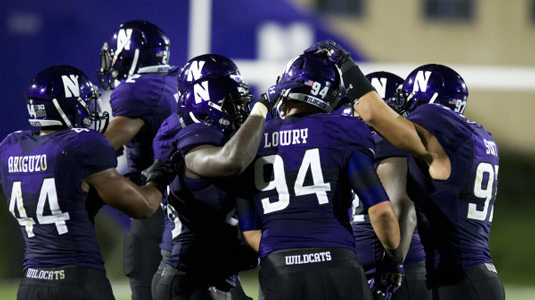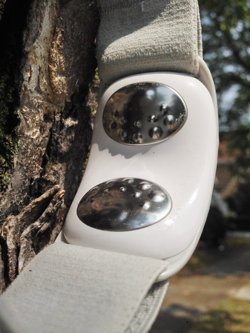Better Football? Try Better Sleep
McCormick undergraduates, Wildcat coaches seek to increase performance by tracking football players’ sleep patterns

As Northwestern’s football team fights to maintain an unblemished record, its players are armed with a secret weapon: plenty of sleep.
In a study spearheaded by three undergraduates at the McCormick School of Engineering, the Wildcats have started wearing motion sensor armbands that track the quality and quantity of their sleep. Those data — which are collected voluntarily and shared with Northwestern’s football coaches — can be used to improve the students’ performance on the field and better understand the connection between being well rested and being at the top of one’s game.
The project started last spring, when Jeffrey Kahn, a McCormick BS/MS student studying health systems engineering, and Jacob Kelter, a senior majoring in complex systems, worked with Dan Brown, clinical associate professor at the Segal Design Institute, to create an independent study about sleep.
Like many college students, Kahn and Kelter knew the effects of sleep deprivation.
 “Study after study says that sleep has a huge effect on memory, mood, cognition, and yet there’s this sleep machismo at a lot of universities, like sleep is for lazy people,” Kahn said. “We wanted to explore how much sleep students are getting and how it is affecting them.”
“Study after study says that sleep has a huge effect on memory, mood, cognition, and yet there’s this sleep machismo at a lot of universities, like sleep is for lazy people,” Kahn said. “We wanted to explore how much sleep students are getting and how it is affecting them.”
Using their knowledge about the human-centered design process, the pair spent months reading scientific literature about sleep, interviewing students and sleep experts, and tracking their own sleep cycles. They tested a variety of sleep-monitoring technologies before selecting a suite of four sensors that track the subject’s sleep through their position and body temperature.
An introduction to the Wildcats coaches over the summer led to a collaboration, and the nearly-100 Wildcat players received armbands for the start of training camp on August 4. Kahn and Kelter provided pointers about how they could improve sleep quality — the optimal environment and length for a nap, for example. They also brought on Leon Sasson, a computer science student, to create a web app on which Wildcat coaches can access the data.
Kahn, Kelter, and Sasson envision a time when sleep assessments play a greater role not just in sports, but education. “I used to get six hours of sleep a night, and I had no idea how bad it was for me. It’s awful for learning and mood,” Kelter said. “Ideally, we would like to see all McCormick students wearing these.”
So how are the Wildcats sleeping?
“Right now, they have decent sleep schedules, but that’s because they’re training full-time,” Kahn said. “It will be interesting to see how that shifts when classes start.”
Read about the sleep-tracking project in the New York Times and the Chicago Tribune.